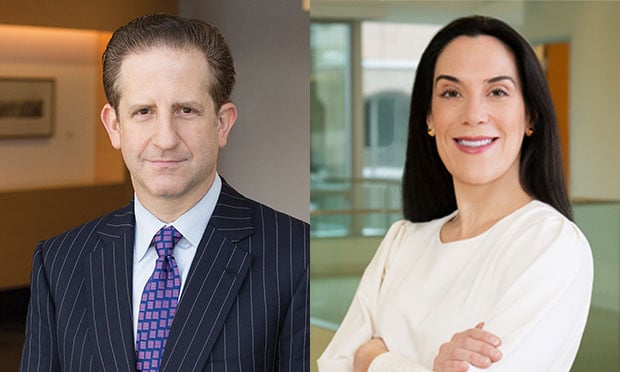Civil Jury Trials and COVID-19: How Civil Litigants Can Reach Resolution in the Wake of a Global Pandemic
When the trial courtrooms do re-open, what options will litigants have to see their cases to resolution? And as important, when jury trials recommence, what will they look like?
April 22, 2020 at 11:03 AM
7 minute read
 Rob Shwarts and Diana Fassbender of Orrick, Herrington & Sutcliffe (Photo: Courtesy Photo)
Rob Shwarts and Diana Fassbender of Orrick, Herrington & Sutcliffe (Photo: Courtesy Photo)
Our court system, especially our trial courts, has been severely impacted by the COVID-19 crisis, where jury trials are largely frozen. In California, for example, jury trials in state court are suspended until at least late May 2020. And most federal district courts throughout the country have suspended trials until June. Realistically, litigants should expect that the hold on trials likely will continue past anticipated dates in many jurisdictions.
When the trial courtrooms do re-open, what options will litigants have to see their cases to resolution? And as important, when jury trials recommence, what will they look like?
It is already becoming clear that once trials do resume, courts will need to focus on high priority matters first, such as criminal cases, unlawful detainer suits, and cases with state statutory deadlines. Courts then will have to re-set at least a three-month backlog of civil cases originally scheduled for trial during the COVID-19 closures. The likely result is that cases slotted for trial in the second half of 2020 are certain to get pushed further down in the queue. The overall result? The majority of civil trial dates that were on the books for 2020 are likely to get re-set for some time in 2021.
Civil litigants now face a decision about litigation strategy. For some litigants, particularly defendants, the delay may be welcome. Slowing down a case can cause a plaintiff to lose momentum and allow more time to fully develop defenses. A delay also may help pace out legal spend, a consideration that may become all the more important to corporations whose businesses have been financially impacted by the COVID-19 shutdowns.
First, for those parties who wish to maintain their right to a jury trial, albeit delayed, it begs the question of not only when but how civil trials can resume. Even in a world where social distancing measures still prevail, it is easier to imagine federal court jury trials resuming more efficiently. First, under Fed. R. Civ. Pro. 48, the court may proceed with six jurors (and can proceed with less than twelve by stipulation in a criminal trial). A smaller jury can keep spacing in the box and in the deliberation room. Second, as important, most federal courtrooms have ample space to allow the attorneys, courtroom personnel and jurors to maintain adequate spacing. Third, federal courts are technology-friendly, allowing most of the evidence to be displayed on screen for the court and jury.
State courts may have more of a dilemma. In state courts that require 12 jurors (or near that number) to reach a verdict, temporary modifications to state law may be needed to allow a smaller number of jurors to hear a case, so as to respect the desire for social distancing to continue. Further, many state courtrooms are far tighter than their federal counterparts (Los Angeles Superior comes to mind). Court administrators may have to consider limiting the number of people in a particular courtroom, or even modifying the seating in courtrooms to allow people to maintain comfortable spacing.
In both federal and state court, administrators will have to address logistics of jury selection. Courts will have to limit the number of jurors called each day, then bring them to the courtroom in smaller numbers during jury selection in order to allow everyone to maintain social distance. The tradeoff will be in fewer available jurors for trial and a slower jury selection process.
This, of course, presumes that our fellow citizens will be comfortable appearing for jury duty at all, even with modifications put in place. Will the courts require testing before entering the courthouse? Will court administrators allow people to avoid jury service due to concerns about the virus? Will individuals in high risk populations be exempt from service? The venire may well not be a representative cross section of the community; at minimum, it will be a very different venire than the parties would have seen absent the pandemic.
It is also conceivable that courts may begin to rely more on technology in conjunction with jury trials. Certain aspects of proceedings could be conducted remotely or by video. Litigants will want to consider whether any technological modifications reduce any advantages to going forward with a jury trial or make the process more frustrating for jurors.
One final consideration for parties who are inclined to insist on their jury rights: will jurors be hostile to being required to serve on a jury while fears of the COVID-19 virus loom? If so, is it possible that their annoyance may come out (subconsciously) in the verdict or any damages award? This is a particularly valid concern for litigants involved in a fairly standard commercial dispute that does not implicate life-or-death or liberty issues. Business litigants need to keep in mind that many people in the U.S. may continue to feel traumatized by the COVID-19 pandemic and do not see the country being back to business as usual. "Forcing" jurors to resolve a business matter under these circumstances may redound to the detriment of one or both parties.
The prospective delays in getting to a jury trial, or the practical and tactical concerns outlined above, may force litigants to consider alternatives to jury trials. First, parties may decide to waive their right to a jury trial and agree instead to a bench trial (although crowded calendars may still delay those as well). Second, arbitration or alternative dispute resolution may be a viable option, again if both sides agree. To the extent that social distancing guidelines continue to guide our behavior, both bench trials and arbitration provide a feasible setting to conduct evidentiary hearings while maintaining social distancing measures.
A bench trial or arbitration as an alternative to a jury trial may have certain appeal to both sides of a case. For a defendant, especially in a complex civil case or in a matter where there is advantage to avoiding emotion in the ruling, removing the jury from the equation may be smart. There also may be business reasons why it is preferable to obtain resolution soon, conclude the litigation, and move on.
For a plaintiff who under normal circumstances would be inclined to have a jury hear its case, pursuing an alternative would of course require foregoing the jury element. But the decision ultimately may come down to how quickly the plaintiff wishes to obtain justice—and importantly—damages. If a plaintiff originally anticipated having its case resolved within the next year, then a compromise to a jury trial will be necessary in order to achieve that timing.
The COVID-19 virus has upended most aspects of the world as we know it. That holds true for our justice system. Civil litigants especially will need to show flexibility and assess their values and motivating principles in making litigation strategy determinations with counsel for the foreseeable future.
Rob Shwarts, a partner in the San Francisco office of Orrick, Herrington & Sutcliffe, has handled dozens of trials and arbitrations and heads the firm's trade secrets practice group and the firm's practice management committee. Diana Fassbender is of counsel in Orrick's Washington, D.C. office and a member of the firm's IP litigation practice)
This content has been archived. It is available through our partners, LexisNexis® and Bloomberg Law.
To view this content, please continue to their sites.
Not a Lexis Subscriber?
Subscribe Now
Not a Bloomberg Law Subscriber?
Subscribe Now
NOT FOR REPRINT
© 2025 ALM Global, LLC, All Rights Reserved. Request academic re-use from www.copyright.com. All other uses, submit a request to [email protected]. For more information visit Asset & Logo Licensing.
You Might Like
View All
'A Death Sentence for TikTok'?: Litigators and Experts Weigh Impact of Potential Ban on Creators and Data Privacy

Shareholder Democracy? The Chatter Musk’s Tesla Pay Case Is Spurring Between Lawyers and Clients
6 minute read

Many LA County Law Firms Remain Open, Mobilize to Support Affected Employees Amid Historic Firestorm
Law Firms Mentioned
Trending Stories
- 1Silk Road Founder Ross Ulbricht Has New York Sentence Pardoned by Trump
- 2Settlement Allows Spouses of U.S. Citizens to Reopen Removal Proceedings
- 3CFPB Resolves Flurry of Enforcement Actions in Biden's Final Week
- 4Judge Orders SoCal Edison to Preserve Evidence Relating to Los Angeles Wildfires
- 5Legal Community Luminaries Honored at New York State Bar Association’s Annual Meeting
Who Got The Work
J. Brugh Lower of Gibbons has entered an appearance for industrial equipment supplier Devco Corporation in a pending trademark infringement lawsuit. The suit, accusing the defendant of selling knock-off Graco products, was filed Dec. 18 in New Jersey District Court by Rivkin Radler on behalf of Graco Inc. and Graco Minnesota. The case, assigned to U.S. District Judge Zahid N. Quraishi, is 3:24-cv-11294, Graco Inc. et al v. Devco Corporation.
Who Got The Work
Rebecca Maller-Stein and Kent A. Yalowitz of Arnold & Porter Kaye Scholer have entered their appearances for Hanaco Venture Capital and its executives, Lior Prosor and David Frankel, in a pending securities lawsuit. The action, filed on Dec. 24 in New York Southern District Court by Zell, Aron & Co. on behalf of Goldeneye Advisors, accuses the defendants of negligently and fraudulently managing the plaintiff's $1 million investment. The case, assigned to U.S. District Judge Vernon S. Broderick, is 1:24-cv-09918, Goldeneye Advisors, LLC v. Hanaco Venture Capital, Ltd. et al.
Who Got The Work
Attorneys from A&O Shearman has stepped in as defense counsel for Toronto-Dominion Bank and other defendants in a pending securities class action. The suit, filed Dec. 11 in New York Southern District Court by Bleichmar Fonti & Auld, accuses the defendants of concealing the bank's 'pervasive' deficiencies in regards to its compliance with the Bank Secrecy Act and the quality of its anti-money laundering controls. The case, assigned to U.S. District Judge Arun Subramanian, is 1:24-cv-09445, Gonzalez v. The Toronto-Dominion Bank et al.
Who Got The Work
Crown Castle International, a Pennsylvania company providing shared communications infrastructure, has turned to Luke D. Wolf of Gordon Rees Scully Mansukhani to fend off a pending breach-of-contract lawsuit. The court action, filed Nov. 25 in Michigan Eastern District Court by Hooper Hathaway PC on behalf of The Town Residences LLC, accuses Crown Castle of failing to transfer approximately $30,000 in utility payments from T-Mobile in breach of a roof-top lease and assignment agreement. The case, assigned to U.S. District Judge Susan K. Declercq, is 2:24-cv-13131, The Town Residences LLC v. T-Mobile US, Inc. et al.
Who Got The Work
Wilfred P. Coronato and Daniel M. Schwartz of McCarter & English have stepped in as defense counsel to Electrolux Home Products Inc. in a pending product liability lawsuit. The court action, filed Nov. 26 in New York Eastern District Court by Poulos Lopiccolo PC and Nagel Rice LLP on behalf of David Stern, alleges that the defendant's refrigerators’ drawers and shelving repeatedly break and fall apart within months after purchase. The case, assigned to U.S. District Judge Joan M. Azrack, is 2:24-cv-08204, Stern v. Electrolux Home Products, Inc.
Featured Firms
Law Offices of Gary Martin Hays & Associates, P.C.
(470) 294-1674
Law Offices of Mark E. Salomone
(857) 444-6468
Smith & Hassler
(713) 739-1250






